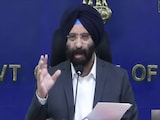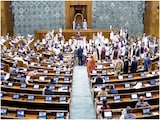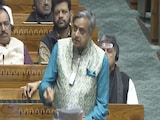While Hamas Politburo chief Ismail Haniyeh's assassination in Iran's capital Tehran mere hours after the swearing-in ceremony of President Masoud Pezeshkian has created shockwaves across the world, the response to the killing is expected to be imminent, and, possibly, tectonic.
Haniyeh was, after all, the political chief of a group labelled a terror entity by the US and many others. In fact, some had designated the group so long before they listed Al Qaeda in the same bracket. The likes of Al Qaeda saw a more rapid ascent in using violence globally, culminating with the 9/11 terror attacks in the US, which also launched a two-decade-long 'war on terror'. The likes of Hamas, on the other hand, confined themselves around the issue of both the sovereignty of Palestine and a fundamental ideological aversion to the state of Israel.
'Axis of Resistance' At Iranian President's Swearing-In Ceremony
The killing of Haniyeh is shocking but not unexpected. In November 2023, a month after Hamas orchestrated the terror attack against Israel - from which the group continues to hold hostages - the Israeli establishment had made it clear that it would go after the leadership of the likes of Hamas in Gaza, the Hezbollah in Lebanon, and others. Back then, the Yemen-based Ansrallah (more popularly known as the Houthis) was not as big an actor as it has today become, specifically in the Red Sea theatre. At Pezeshkian's swearing-in, the leadership of all these groups, known more formally as the 'Axis of Resistance', were in attendance.
Watch | What Hamas Chief Ismail Haniyeh Did Hours Before His Assassination
The fact that Haniyeh was killed in the middle of Tehran at a time when it was teeming with military personnel sends out a strong message of both access to and the compromise of Iranian security and polity infrastructure. This further underscored the fact that a narrative was built to showcase where groups like Hamas gain their strength from (although this has not been an area of question or contention). While Israel has not taken responsibility for the attack, Iran blames the Jewish state for the same. However, Israel has, in the meantime, taken responsibility for the killing of top Hezbollah commander Fouad Shukur in a strike on the Lebanese capital of Beirut, and the elimination of Hamas military commander Mohammed Deif in Gaza, known to be a key architect of the October 7 terror strike.
What Next?
The big question at this juncture is, what next? In April, Iran retaliated against Israel after the latter targeted what Tehran claimed was part of its diplomatic mission in Damascus, Syria. This event set forth an escalation ladder where Iran could not be seen as being unable or incapable of directly responding militarily and not just via its knitting of proxy groups spread across the region. While Tehran for long has sought to create a level of strategic ambiguity, where attacks by proxy groups that receive material and political support from the country's all-powerful Islamic Revolutionary Guard Corps (IRGC) and its elite clandestine foreign wing, the Quds Force, gave it a level of deniability, Haniyeh's assassination may in part be designed to reverse this blueprint and pull Iran out of its own shadows, into a more direct, visible, and public confrontation.
Also Read | Iran's Leader Orders Attack On Israel After Hamas Chief's Killing: Report
Even if Iran would for the moment want to hold back, the rhetoric and expectation from its Axis partners may not allow it to do so. If by way of argument, Israel is goading a response from Tehran, a speech given by Hezbollah chief Hassan Nasrallah on Thursday found itself in the same space as Israel, looking for an active response from the Iranian side. "Do those people think they can kill a commander like Ismail Haniyeh and Iran will remain silent?" Nasrallah said as he laid out a requirement for avenging Haniyeh's death. For long, the Iran-backed Axis has fought for its own ideological and political aims that feed into a larger construct, in way of providing manpower and geography alike. During this, they have also absorbed tremendous loss. This is especially true for the Hamas in Gaza. It may become hard for Iran now to exercise strategic restraint, even though the likes of Hezbollah may well do so themselves in the long term, despite the rhetoric.
Some Forced To Find A Middle Path
For others in the region, specifically in the Arab Gulf, the current trajectory of escalation remains worrying. Many top Arab representatives, including from the UAE, Bahrain, Kuwait, Saudi Arabia, and other countries, were present at Pezeshkian's inauguration. The likes of Saudi Arabia and the UAE in the recent past have increased their engagement with Iran in a bid to course-correct the long-standing narrative of Shia-Sunni confrontations. While sectarian issues remain mostly entrenched, geopolitical and geoeconomic realities have forced those like Saudi Arabia, for example, to find a middle path with the Houthis in Yemen via dialogue, a group with which they technically have been at war since 2015.
For Riyadh, Abu Dhabi, and so on, reconstructing this crisis first as one between Israel and Iran, and then, as a longer and larger battle for Palestinian self-determination, may well be crucial to secure their own neutrality.
Region Remains Sensitive
The US, a core security player in the region, has been relatively silent since Haniyeh's death. US President Joe Biden has said that Haniyeh's killing will not help the ceasefire and a negotiated deal with Hamas over the release of Israeli hostages. Israel's Prime Minister Benjamin Netanyahu, himself facing severe political headwinds, seems to have chosen the popular demand to eliminate figureheads such as Haniyeh at a time when, even if a deal was brokered, he would have had to release in exchange hundreds of Hamas members who are currently being held in Israeli prisons.
Finally, regional tensions are expected to remain significantly high in the days to come as Iran and its proxies decide upon a response. In April, there were hints that the escalation between Iran and Israel was at some level mitigated and managed, perhaps via indirect communication or some kind of mediation. This time, the region may well not be so lucky unless a regional and global effort to calm the situation down is mobilised immediately.
[Kabir Taneja is a Fellow with the Strategic Studies Programme at the Observer Research Foundation. He is the author of 'The ISIS Peril: The World's Most Feared Terror Group and its Shadow on South Asia' (Penguin Viking, 2019)]
Disclaimer: These are the personal opinions of the author















